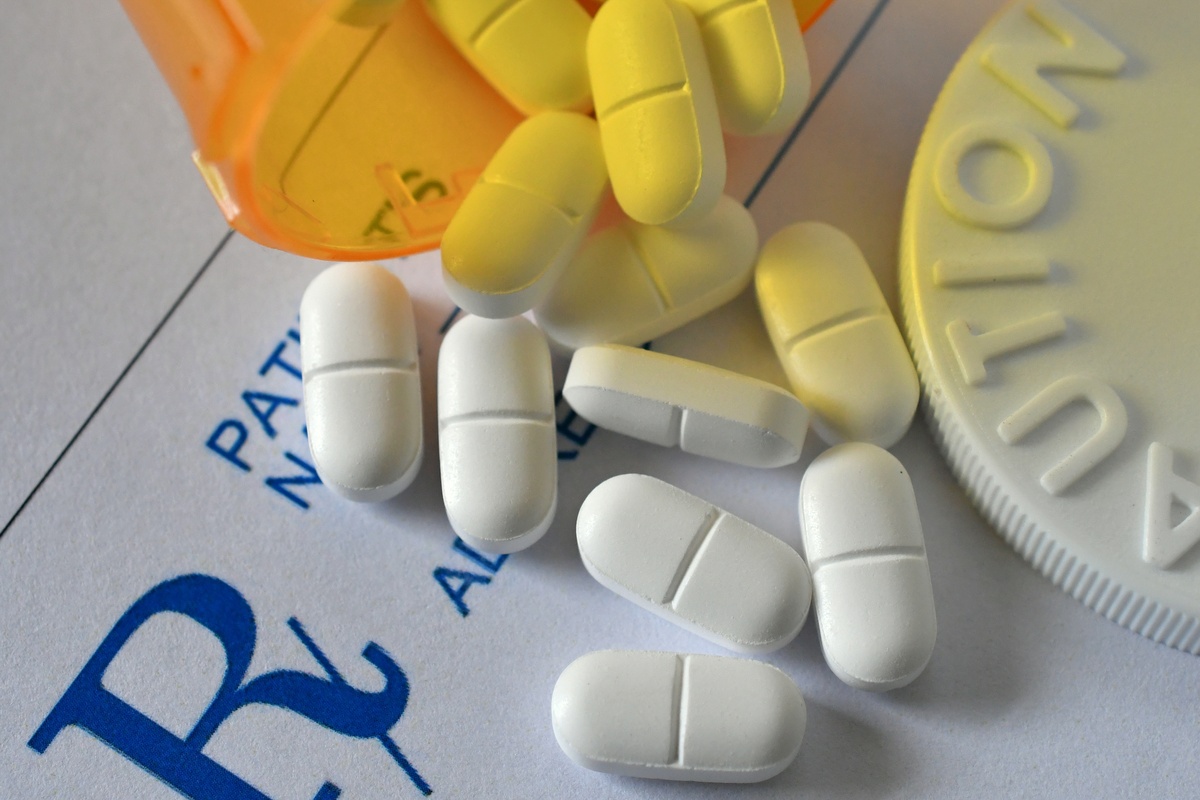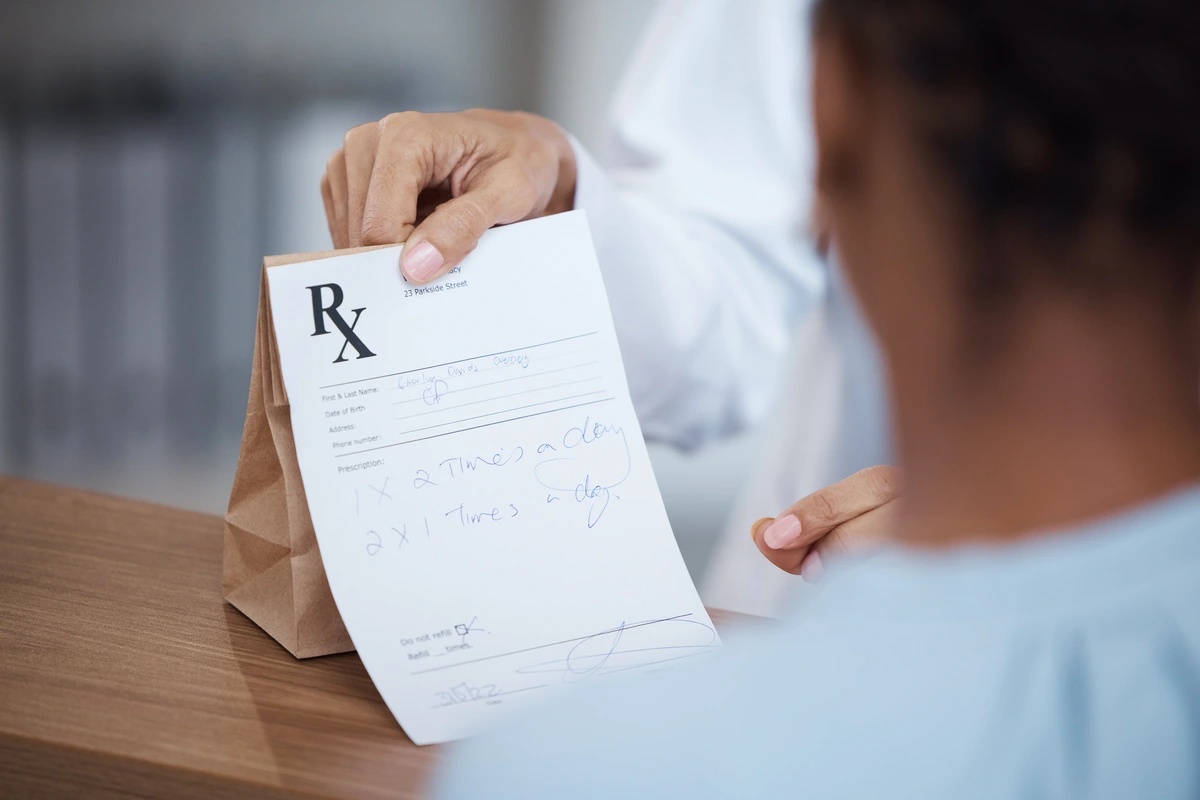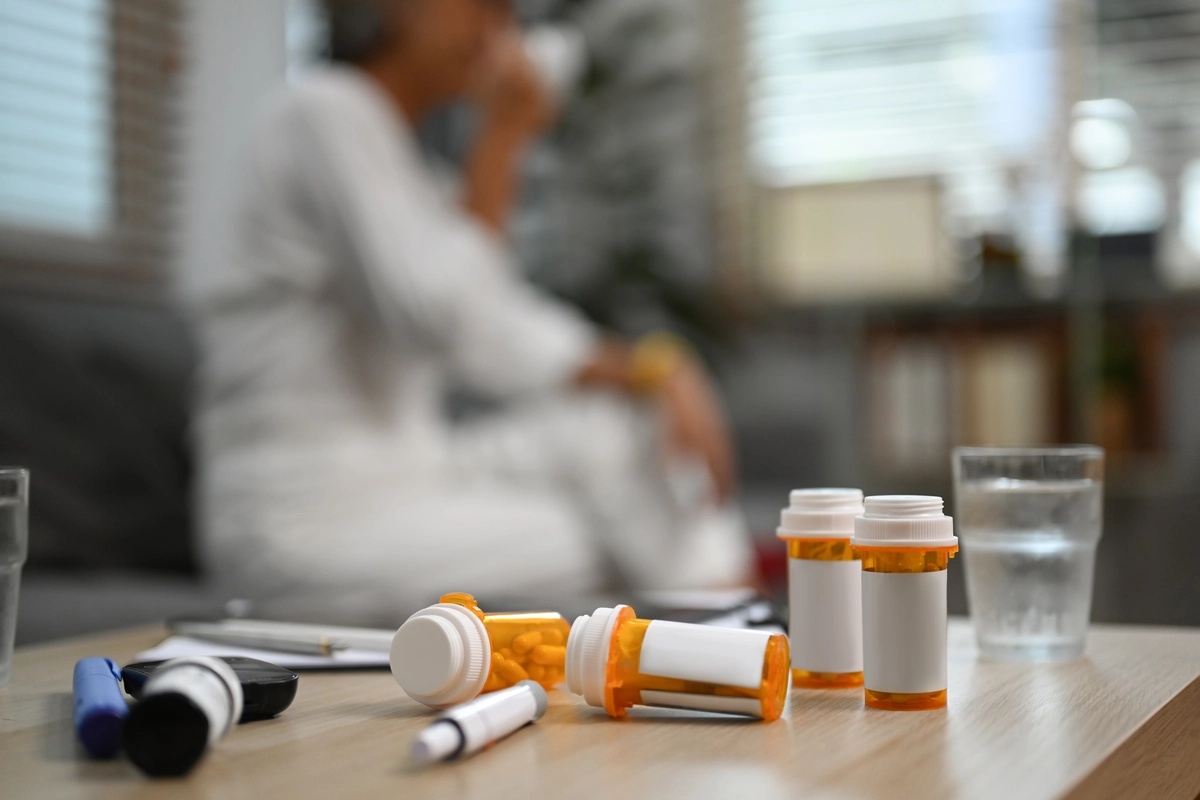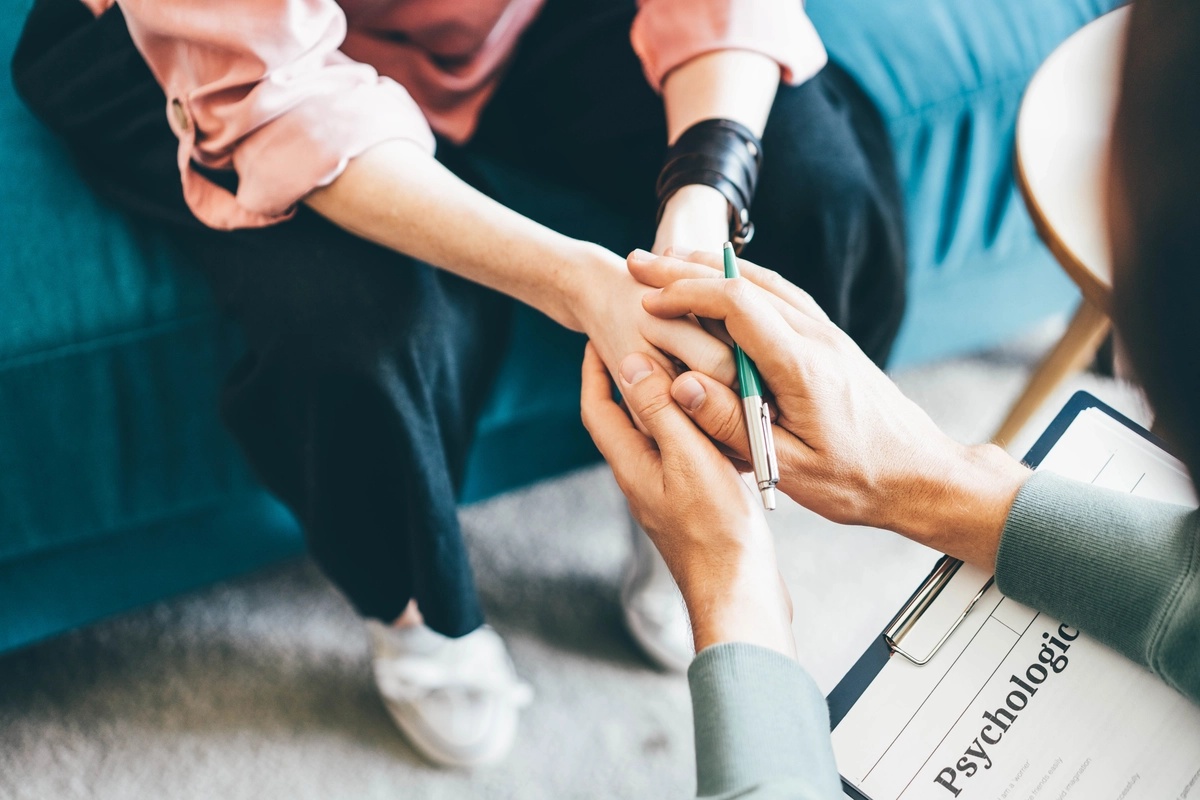Prescription Drug Addiction: Signs, Symptoms, & Treatment Options

Prescription drug addiction starts with a prescription, but quickly spirals into a relentless cycle of physical symptoms, mental struggles, and disrupted lives. Explore the symptoms and treatment pathways for prescription drug addiction, and contact The Edge Treatment Center for comprehensive care and support.
What Is Prescription Drug Addiction?
Prescription drug addiction, also known as prescription drug abuse, is a serious and growing problem where individuals misuse or overuse prescription medications for non-medical purposes. This can include taking higher doses than prescribed, using someone else's prescription, or even doctor shopping to obtain multiple prescriptions.
Prescription drug addiction can lead to physical dependence, tolerance, and withdrawal symptoms when the drug is not taken. It can have severe consequences on a person's health, relationships, and overall well-being. Seeking help from healthcare professionals and support groups is crucial for overcoming prescription drug addiction and regaining control of one's life.
Prescription Drug Addiction Vs. Substance Abuse
Prescription drug addiction is a form of substance abuse characterized by a dependence on legally obtained medications, leading to compulsive use and harmful behaviors despite adverse consequences. Unlike broader substance abuse, which includes the misuse of illegal drugs and alcohol, prescription drug addiction often necessitates specialized treatment combining behavioral therapies and medication-assisted treatments to address the unique challenges and needs of the individual.

Signs & Symptoms of Prescription Drug Addiction
Recognizing the Signs
To spot prescription drug addiction, look for behavior changes like mood swings and secretiveness, physical signs such as dilated pupils, frequent early refill requests, and doctor shopping, which means getting prescriptions from several doctors. These are clear signs of dependency.
Early Intervention & Support
Early action is key to tackling prescription drug addiction. Open talks and showing worry can make people see they need help. Getting advice from doctors or addiction experts can point to the right treatments. Making a helpful setting and cutting off access to prescription meds can help recovery. Therapy, both one-on-one and in groups, is vital for learning about triggers and making coping skills.

We’re Here to Help You Find Your Way
Would you like more information about mental health or drug addiction? Reach out today.
How Is Prescription Drug Addiction Treated?
Prescription drug addiction is typically treated through a combination of therapies and medications. The process starts with detoxification, where the patient is gradually weaned off of prescription drugs under medical supervision, and ends with aftercare support:
Detoxification
Detoxification is the first step in treating prescription drug addiction. It involves clearing the body of drugs under medical supervision. This process helps manage withdrawal symptoms and ensures safety. Medications may be administered to ease discomfort during detox. In some cases, detoxification can be done on an outpatient basis, but severe cases may require inpatient care for closer monitoring. The duration of detox varies based on the type of drug and individual factors.
Inpatient Care
Inpatient care provides a structured environment for individuals struggling with prescription drug addiction. Patients receive 24/7 medical support and therapy sessions to address underlying issues contributing to addiction. The immersive nature of inpatient treatment minimizes external triggers and distractions. Therapeutic interventions such as cognitive-behavioral therapy (CBT) and group counseling are commonly utilized in inpatient care settings to promote recovery and prevent relapse.
Outpatient Support
After completing inpatient treatment, individuals often transition to outpatient programs for ongoing support. Outpatient support allows patients to continue therapy while reintegrating into their daily lives. Regular counseling sessions and medication management help maintain sobriety outside of a residential setting. Outpatient programs offer flexibility, enabling individuals to attend treatment sessions while fulfilling work or family commitments.

Aftercare
Aftercare is crucial in sustaining long-term recovery from prescription drug addiction. It involves ongoing support through counseling, support groups, and relapse prevention strategies. Establishing healthy routines and coping mechanisms is essential in preventing relapse post-treatment. Engaging in aftercare services enhances the chances of maintaining sobriety and addressing any challenges that may arise during the recovery journey.
Prescription Drug Addiction Therapies
Prescription drug addiction therapies encompass a range of treatments from medical interventions to medication-assisted therapy, each designed to address the multifaceted nature of prescription drug addiction and pave the way for sustainable recovery.
Medical Interventions
Medical interventions for prescription drug addiction often start with detoxification in a controlled environment to manage withdrawal symptoms and stabilize the patient. Medications may be prescribed to ease cravings and discomfort during detox, with close monitoring of vital signs to ensure safety, setting the stage for further treatment steps.
Medication-Assisted Treatment (MAT)
Medication-assisted treatment (MAT) for prescription drug addiction uses therapy and specific medications to restore normal brain function and prevent relapse. Tailored to each person, MAT includes drugs like methadone and counseling to tackle addiction’s root causes and support recovery.

We’re Here to Help You Find Your Way
Do you have more questions about mental health or drug addiction? Reach out.
Commonly Abused Prescription Drugs
Opioids, sedatives, and stimulants are all forms of commonly abused prescription drugs, all posing their own distinct risks and effects:
Opioids
Opioids, such as oxycodone and hydrocodone, are powerful pain relievers that can be highly addictive. These drugs interact with the brain's opioid receptors, leading to a euphoric effect. The misuse of opioids can result in respiratory depression and even overdose deaths.
Sedatives
Benzodiazepines like Xanax and Valium are commonly abused sedatives that act as central nervous system depressants. They are prescribed for anxiety and sleep disorders but can cause drowsiness, confusion, and addiction when misused. Combining sedatives with alcohol or other drugs can be fatal.
Stimulants
Prescription stimulants like Adderall and Ritalin are often misused to increase focus and energy. However, prolonged use can lead to tolerance, dependence, and severe withdrawal symptoms. Stimulant abuse can also result in cardiovascular issues and psychiatric complications.

Causes of Prescription Drug Addiction
Prescription drug addiction can stem from accessibility, chronic pain management, lack of awareness about drug risks, mental health self-medication, peer influence, and genetic predisposition, all of which contribute to the risk of dependency.
Easy Access
Prescription drugs are easily accessible, often found in medicine cabinets at home or obtained through multiple prescriptions from different doctors.
Pain Management
Individuals may develop an addiction to prescription drugs while seeking relief from chronic pain conditions, leading to dependency over time.
Lack of Awareness
Many people are unaware of the addictive nature of certain prescription medications, assuming they are safe because they are prescribed by healthcare professionals.
Mental Health Issues
Those struggling with mental health disorders may turn to prescription drugs as a way to self-medicate, inadvertently developing a substance use disorder.
Peer Influence
Peer pressure and influence can play a significant role in the initiation and continuation of prescription drug abuse among individuals, especially in social settings.
Genetics
Genetic predisposition can also contribute to an individual's susceptibility to developing an addiction to prescription drugs, making some more vulnerable than others.

We’re Here to Help You Find Your Way
Do you need advice about mental health or drug addiction? Reach out today.
Long-Term Impact
Prescription drug addiction’s long-term impact includes physical harm like organ damage and tolerance, leading to overdose risks and psychological issues such as anxiety and cognitive impairments, which can disrupt relationships and financial stability.
Physical Effects
Prescription drug addiction can lead to serious problems such as organ damage, cardiovascular issues, and weakened immune system. Prolonged use often results in deteriorating physical health, impacting daily functioning. The body develops a tolerance to the drugs, requiring higher doses for the same effect. This can increase the risk of overdose and chance of fatal consequences. Withdrawal symptoms like nausea, tremors, and seizures are common.
Psychological Effects
Serious problems arise in mental health with prescription drug addiction. Individuals may experience anxiety, depression, mood swings, and cognitive impairments. The addiction alters brain chemistry leading to long-lasting psychological effects. Addiction can strain relationships, cause financial difficulties, and lead to social isolation. The constant need for the drug can consume one's thoughts and behaviors, affecting decision-making abilities.

Prevention Strategies
Prescription drug addiction often starts innocently, following a doctor's orders. However, the risk of addiction increases when individuals deviate from prescribed doses. This can lead to dependence and addiction over time.
Following Prescription Guidelines
To prevent this, it’s vital to stick to the prescribed dose, consult doctors before changes, and never share medications. Proper storage and disposal of medications, such as using take-back programs, are key to reducing addiction risks. In cases where the prescribed medication is no longer needed, consider safe disposal methods like local take-back programs or pharmacies that accept unused drugs. By following these guidelines, you can reduce the risk of prescription drug addiction significantly.

We’re Here to Help You Find Your Way
Would you like more information about mental health or drug addiction? Reach out today.
Withdrawal Symptoms: Prescription Drug Addiction
Prescription drug addiction withdrawal induces certain physical and mental challenges, including:
Physical Effects
Prescription drug addiction withdrawal symptoms can manifest physically, such as muscle aches, nausea, and tremors. These symptoms often peak within the first few days of discontinuing the drug. Sweating excessively, experiencing gastrointestinal distress, and having flu-like symptoms are common physical manifestations during prescription drug addiction withdrawal. The body's dependence on the substance leads to these uncomfortable reactions.
Psychological Impact
Mood swings, anxiety, and irritability are prevalent psychological effects of prescription drug addiction withdrawal. Individuals may also experience depression and confusion during this challenging period. The psychological impact of prescription drug addiction withdrawal can be intense, leading to emotional instability and mental distress. Such symptoms can significantly impact an individual's daily life and well-being.
Closing Thoughts
You now understand the complexities of prescription drug addiction, from its signs and symptoms to treatment options and prevention strategies. By recognizing the causes, impacts, and therapies available, you are equipped to address this issue proactively.
Remember, seeking help is a sign of strength, and support is always within reach. Take action today to safeguard your well-being or that of a loved one. Addiction is a battle best fought with knowledge, guidance, and determination.
The Edge Treatment Center: Your Haven for Recovery
Prescription drug addiction can lead to distressing withdrawal symptoms, affecting both your health and relationships. At The Edge Treatment Center, we recognize the challenges you face, and provide evidence-based therapies to help you holistically overcome your dependence on prescription drugs.
When you’re prepared to build a healthier life and learn new ways to cope, reach out to The Edge Treatment Center. Together, we’ll navigate your healing journey together — and guide you toward a life free from prescription drug addiction.

Treatment Modalities We Offer
The Edge Treatment Center uses a range of proven methods to help you beat prescription drug addiction and get to the heart of your dependency. Our treatment modalities include:
Case Management
Our case managers provide essential support to patients, guiding them to resources that aid in their recovery from prescription drug addiction and overall health. They consider factors such as individual needs and risk of dependence to ensure a comprehensive approach to addiction management.
CBT
Cognitive Behavioral Therapy (CBT) empowers those in recovery to transform negative thought patterns and behaviors associated with their prescription drug addiction. It addresses the brain’s response to substances, aiming to reduce the chance of relapse and promote a drug-free life.
DBT
Dialectical Behavior Therapy (DBT) is particularly effective in helping individuals cope with the emotional struggles of substance abuse, enhancing their ability to manage intense feelings and work towards positive life changes.
EMDR
Eye Movement Desensitization and Reprocessing (EMDR) therapy assists patients in processing and overcoming traumatic past events that may have contributed to their addiction, focusing on eye movement patterns to alleviate symptoms.
Experiential
Engaging in experiential activities offers a unique form of therapy, allowing those in recovery to rediscover joy and appreciation for life, which can be pivotal in managing traumas that fuel addictive behaviors.
Family Counseling
Family counseling plays a critical role in supporting an individual’s journey to overcome prescription drug addiction. It fosters stronger family bonds and provides a network of encouragement essential for sustained recovery and sobriety.
Group Therapy
Group therapy creates a communal space for individuals grappling with addiction to share experiences and offer mutual support, enhancing the recovery process through shared stories and strength.
Individual Therapy
Individual therapy sessions are tailored to meet the unique challenges each person faces, providing targeted support to navigate the path to a drug-free lifestyle.
MAT
Medication-Assisted Treatment (MAT) combines safe, approved medications with therapy to effectively manage addiction, reducing symptoms of withdrawal and the risk of relapse.
TMS
Transcranial Magnetic Stimulation (TMS) is an innovative, non-invasive therapy that uses magnetic fields to activate brain cells, helping to diminish the intense cravings that can lead to relapse in substance abuse.
Motivational Interviewing
This technique motivates individuals to discover personal motivations for making healthy changes, such as overcoming cocaine addiction, by fostering a sense of reward and achievement.
Trauma-Informed Care
Trauma-informed care is essential in recognizing how trauma impacts an individual, which is a critical aspect of guiding them through the addiction treatment process, acknowledging the profound effects on their brain and behavior.

We’re Here to Help You Find Your Way
If you or a loved one is struggling with addiction, there is hope. Our team can guide you on your journey to recovery. Call us today.
FAQ
